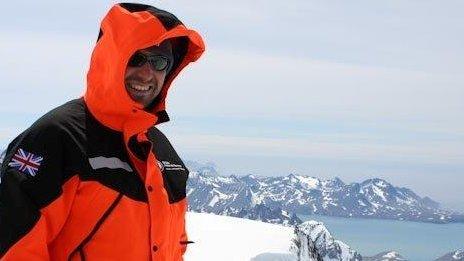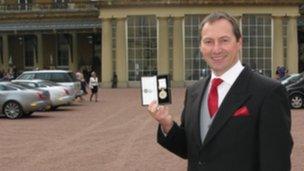Polar Medal for Northamptonshire geologist
- Published

Mike Curtis has mapped polar regions for 18 years
Living in a tent in the Antarctic for months at a time is just part of the day job for Northamptonshire adventurer Mike Curtis.
The geologist from Thrapston is regularly dropped into remote mountain ranges, given a ski-doo and left for weeks, sometimes months, to examine the land.
"It is a dangerous environment, there are challenges," he said.
"But the job is quite self-selecting, if you don't enjoy the challenge then you would quit."
Dr Curtis has spent 18 years working for the British Antarctic Survey. For two of those years he lived in a tent in freezing conditions.
"The longest time I spent in a tent was 100 days, but when I first joined the Antarctic Survey we used to go away for close to five months," he said.
"Expeditions are shorter now."
They might be shorter, but they are no less harrowing.
"We are self sufficient, we travel around, it's an incredible adventure," Dr Curtis added.
"My part of the job would be to map the geology and publish the results.
"We always work in pairs, you couldn't do this alone."
His dedication to finding out about the land in extreme conditions has made some important contributions to the knowledge of the Polar region, which led him to be selected for the Polar Medal.
"Mike was selected for the Polar Medal for his outstanding efforts in making geological maps of some of the remotest regions in Antarctica," said a spokesperson for the British Antarctic Survey.
"He completed some 10 Antarctic field seasons, pioneered research into some of the most complex rock sequences in Antarctica and this in turn enabled us to understand fundamental processes such as plate tectonics and the break-up of the Gondwana super continent."
'Real privilege'
To map the land Dr Curtis uses aerial photographs, satellite images and GPS, and records the different types of rock found within a given area.
The information is typed directly into a small tablet computer. Dr Curtis was a pioneer of computer-based geological mapping in Antarctica.
On Thursday, Dr Curtis swapped the polar regions for Buckingham Palace for the day - where the Queen presented him with his Polar Medal.
"It was a real privilege to meet the Queen," he said.

Geologist Mike Curtis lived in a tent in the Antarctic
"The medal means a lot, not just for me but for my family and girlfriend. They make a big sacrifice.
"When I go away to have the most wonderful adventures, they are waiting to hear from me."
He has now joined the ranks of other outstanding adventurers to be given the medal - including two of the men who engaged in a search expedition to discover the fate of Sir John Franklin and his crew who were lost while looking for the Northwest Passage in 1847.
In 1904, the Polar Medal was inaugurated for members of Captain Scott's first expedition to Antarctica. The medal was also awarded to members of Ernest Shackleton's expeditions in 1907-09 and 1914-17.
"The people who do this sort of work love the experience of the being there, it's always a difficult thing to leave the place," said Dr Curtis.
"I have had wonderful experiences -pods of killer whales 10m from me catching seals. It's mind blowing."
It is not the end for Dr Curtis' adventures - this summer he will spend time in Arctic Russia.